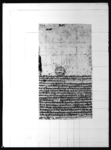A lālamohara from King Girvāṇayuddha placing Kedāranātha Jhā Paṇḍita in charge of manuscripts and books in the royal palace (VS 1869)
ID: DNA_0016_0093
Edited and
translated by Axel Michaels
in collaboration with
Manik Bajracharya
Created: 2016-04-26;
Last modified: 2018-06-22
For the metadata of the document, click here
The accompanying edition, translation/synopsis and/or commentary are available under the terms of the Creative Commons Attribution-ShareAlike 4.0 International License
Abstract
This is a lālamohara sent by King Girvāṇayuddha to Kedāranātha Paṇḍita appointing him as a librarian to look after, store and collect "books" and/or manuscripts (pustaka) in a special office called "book room" pustakakoṭha. Among his particular duties is to protect the texts from insects and to worship them on special occasions.Diplomatic edition
[1r]
⟪1नं.५०३⟫1श्रीदुर्गा१1सरस्वती[Royal seal]1स्वस्तिश्रीगिरिराजचक्रचूडामणिनरनारायेणेत्यादिविविधविरूदावलिविराजमा2नमानोन्नतश्रीमन्महाराजाधिराजश्रीश्रीश्रीमहाराजेगीर्वाणयुद्धवहादुरसम
3सेरजंगदेवानांसदासमरविजयिनाम्¯¯ ¯¯ ¯¯ ¯¯ ¯¯ ¯¯ ¯¯ ¯¯ ¯¯ ¯¯
4आगेकेदारनाथझापंडितकेहाम्रादरवारकाजतीपुस्तकछतस्कोचिताईतहविल
5सम्वत१८६९सालदेषीतिमिलाईवक्सौंतिमिलाईआफ्नाषातिर्जामासीतपुस्तकसवैको
6संभारगर्नु•विनाहुकुमपुस्तककसैलाईनदिनु•दर्वारमाकामलाग्यापुस्तककोकामच
7लाउनु•पुस्तककोतहविलआफ्नाजीम्मागरीराष्नु•असुद्धभयाकोपुस्तकसुद्धगर्नु•टुट्या
8फाट्याकोलिषाऊनु•मुसा•कीरा•पानी•अरूविगार्न्यासीतवचाऊनु•दर्वारमानभयाकोपुस्तक
9कामलाग्न्याछभन्या•दर्वारवाटदामलीहुकुमवमोजीमलीषाऊनु•कीन्तु•कामलाग्या
10मापुस्तकहेर्नु•दोईदसमीमाभेटीवोक्यापुस्तकलाईवासा•अरूपूजामाचाहिन्यासर
11जामलीपुस्तककोठामा¯ ¯ ¯ ¯कोपुस्तकसवैकोपूजापाठगर्नु•ऐसकामकोषानगी
12रूपैया१२५सालवसालतिमीलाईगरीवक्स्यौंत्योषानगीषाईरातोदिनपुस्तककोकाममाहा
12जीररहनु•ऐसकाममालेषकरटहलुआमानिसजना२जाचीवुझिराषनु•तस्कोषानगी
12रूपैया७०गरिवक्स्यौं•त्योदी•रातोदिनटहलमारूजुराषनु•भितीरियाकामकोसरहवमो
12जीमदसमीफागूसंकराती•विवाहश्राध्यषर्चरपोसाकमामुलीभय़ाकोलीनु•पुस्त
12ककोठामारातिभरीवातीवालन्यातेलमाना।•पुस्तकलेषन्याकागतमसीहरितालसीमरि
12फ्लीनु•अरूचाहिन्यापुस्तककोकुराविन्तीगर्नू•इतिसंवत्१८६९सालमितिभदौ
12वदि६रोज६शुभम्¯¯¯¯¯¯¯¯¯¯¯¯¯¯¯¯¯¯¯¯
Translation
[1r]
No. 5031
Venerable Durgā
Sarasvatī
Hail! [A decree] of him who is shining with manifold rows of eulogy [such as] ’The venerable crest-jewel of the multitude of mountain kings’ and Naranārāyaṇa (an epithet of Kṛṣṇa) etc., high in honour, the venerable supreme king of great kings, the thrice venerable great king, Gīrvāṇayuddha Vikrama Śāha Samsera Jaṅga, the brave swordsman, the divine king always triumphant in war.
Āge: To PaṇḍitaKedāranātha Jhā.
We have given to you charge, from [VS] 1869 on, of the office containing all the books (pustaka)2 of our palace. Preserve all the books with a sense of dutifulness to yourself. Do not give any book to anybody without orders [from me]. If a book is useful for palace matters, put it to use it. Maintain the treasury [of funds for] the books as your own responsibility. Make corrections to books with [scribal] errors [in them]. Have books that are worn and torn recopied. Restore (books) as soon as they are damaged by mice, insects, water or other [threats]. Upon orders [to do so], take money from the palace and have books copied that are not in the palace, assuming they are useful. However, if books are [have proved] useful, read them [through]. On both Dasaĩs (text: daśamī), take bheṭī, a he-goat, and (wrapping) cloth and other material required for the books during worship and worship with recitation all the books [considered as] Sarasvatī in the book room (pustakakoṭhā3 ). We have granted to you for this work an annual emolument (khānagī) of 125 rupees. Once you [start] receiving this khānagī remain present day and night for the work on the books. Appoint two men, a scribe and a watchman, for this work, after having [first] examined them. For this we have granted a khānagī of 70 (rupees). Provided this [money to them] and keep them present for service at day and night. Considering that your work is like internal (palace work), draw normal dress and expenses for Dasaĩ, phāgū saṃkrāntī, weddings and annual death rituals (śrāddha). Take one mānā of oil for burning lamps throughout the night in the pustakakoṭhā, paper, ink, orpiment (haritāla), and red powder4 for writing books. If you need other things for the books, make a request.
Friday, the 6th of the dark fortnight of Bhādra in the [Vikrama] year 1869 (1812 CE). [May there be] auspiciousness.
Commentary
Cf. DNA_0006_0058.

